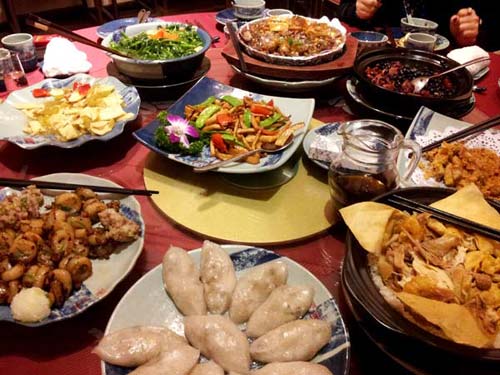
|
Hakka people often find excuses for the lack of presentation for their food, especially compared with their seafood-rich neighbors of Chaozhou and Shantou, where more attention is paid to how dishes are prepared and presented. For an outsider like me, it is in this area that Hakka food stands out. It may not be the best-looking cuisine in the vast array of Chinese gastronomy, but it is surely a strong contender for the best tasting. It reminds one of the kind of food a mother cooks for her child who is visiting after a long absence from home. The Hakka idea of feasting is mostly meat. Its salt-roasted chicken has been incorporated into Cantonese cuisine as a standard. The origin of bean curd stuffed with a small meatball goes back to the time before the Hakka moved away from the Central Plains. Unlikely as it seems, this famous dish is a variation of jiaozi, but since wheat was hard to come by in South China, the Hakka had to make do with tofu. Like its dialect, the Hakka cuisine has traces of their connection to the landlocked north. The emphasis on meat could be a testament to hard times when meat was a luxury and reserved for only the rarest of occasions. But dishes like pork with salted vegetables have gained popularity across the nation. It is, however, pork tripe stewed chicken, among the Hakka staples, that was relatively unknown to me and it proved to be delicious beyond description. Vegetarians need not despair. Traditionally, much of the Hakka diet is sourced from the earth. It might have been out of necessity, but it has been honed into a culinary art. Tell your host that you prefer a healthy portion of vegetarian food and you'll be surprised at the variety that will greet you and your palate. The most dramatic part of my trip to Meizhou involved a snack called yanmian, literally pickled noodle. Filmmaker Zhang Yibai, known for his epicurean knowledge, texted us about a noodle shop in downtown Meizhou that had impressed him a year earlier. Our host called every one of his friends and nobody had heard of this place. One night, after we already had dinner and a midnight snack, we were driving around that area and stumbled upon the extremely inconspicuous stall. We ordered one full portion for everyone - yanmian noodle complete with another bowl of fish soup. Xue Xiaolu, director of Finding Mr Right, ended up ordering one more full serving. That night, I texted a good friend of mine in the United States, whose hometown is Meizhou, about this noodle shop and he replied: "Yanmian is available at every snack stand." Never predict the flavor of food served by the glamour of the venue, or lack thereof. Last but certainly not least is Mama's Red Wine, which is my personal translation of "niang jiu" (niang means mother). It is similar to many local Chinese brews but much sweeter. Distilled from sticky rice and well water, it is traditionally brewed by the matriarch of the household. Nowadays there are plenty of brands and they vary slightly in taste. But invariably they remind me of red wine made from grapes. One sip and I'm transported to the land of hospitality where people may have endured much hardship but have retained their friendly nature. By Raymond Zhou ( China Daily ) |
跟海味十足的潮州菜和汕頭菜比起來,客家菜顯得有些默默無聞,前兩者食材講究,制作精良,上菜時擺盤也很精美,而客家菜卻不怎么講究這些,這樣說來,默默無聞也就情有可原了。 可是在我這個外人眼中,客家菜也正因此才變得引人注目。在中國的各色菜系中,客家菜不是最有賣相的,但是其味道絕不輸給任何菜系。品嘗客家菜,會讓你想起母親的味道,一道道菜就像是母親為遠游歸來的孩子烹飪的美食。
這次的梅州之行中最讓我興奮的應該是吃到了腌面。電影導演張一白,是出了名的美食家,發短信告訴我們梅州市中心有一家面館,一年多以前他在這里吃過一次,非常好吃。我們的主人打電話問了他的所有的朋友,居然沒有人聽說過這家店。一天晚上,我們吃過了晚飯和夜宵,開著車在城里瞎轉,偶然發現了這個非常不顯眼的小攤。我們每人都點了一份套餐——一碗腌面加一碗魚湯。《北京遇上西雅圖》的導演薛曉璐吃完后又點了一份。
(中國日報周黎明) (譯者 EllaQ 編輯 丹妮) |